 Funny how things work inversely with age.
Funny how things work inversely with age.
When you’re young, you’re full of hormones.
You’re lean in knowledge but more than make up for it with boundless energy, a full head of hair, growing bones and the ability to eat whatever you like and not put on weight.
Then there’s the sex drive that propels most guys in their teens and early twenties that needs no introduction.
Thank testosterone for that, which is working overtime during this pivotal stage in a man’s life.
And though it’s a short time in the context of a human life, it’s memorable, to say the least.
Now the inverse part.
At 65, you’ve been around the block.
You’ve spent your life working and most likely have money tucked away and the time to live less frantically than those younger years.
The caveat?
If you’re among the estimated 30% of American men over 50 who struggle with andropause, you’ve got roughly half the less testosterone and growth hormone than you did at 25.
About Andropause
Menopause gets attention.
But somehow, in the media’s scramble to help women address that biological milestone, andropause slipped through the cracks.
Andropause is male menopause.
No jokes about the proverbial mid-life crisis, please – andropause is a serious issue, with symptoms that mirror what noted author Jeb Diamond calls “hormonal, physical, psychological, interpersonal, social, sexual and spiritual.”
Scientifically speaking, andropause is the decline in production of testosterone and growth hormone that occurs with age.
While such a decline is inevitable as a man gets older, andropausal men tend to experience a more noticeable drop in these essential hormones, at roughly one to 1.5% each year after 35.
Symptoms of andropause include:- flagging sex drive- erectile dysfunction- energy loss- muscle loss- weight gain
The symptoms are often made worse by the tendency among many doctors to diagnosis a symptom as an individual condition.
It’s not uncommon for some doctors to prescribe an anti-depressant, for example, to address symptoms of depression from andropause, which aggravates other symptoms, including erectile dysfunction or wavering sex drive.
Causes of Andropause
Injury, medication, surgery, stress, alcohol and a diet rich in fat.
They all add up and affect production of both testosterone and the often intertwined growth hormone.
Another culprit behind andropause, particularly if the decline in hormone production starts in a man’s thirties, is sex hormone binding globulin (SHBG), which prevents testosterone from being used.
And with less testosterone being produced to begin with, the results are vast and far-reaching.
Diabetes and several diseases also play a role in decline in hormone production.
The Role of Testosterone
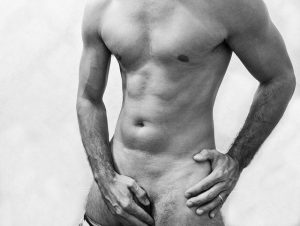 You’re very familiar with this manliest of hormones.
You’re very familiar with this manliest of hormones.
Testosterone is a male sex hormone (androgen) produced by the testes and andrenal glands.
Testosterone builds protein, regulates metabolic function, produces red blood cells in bone marrow, assists with liver function and moderates growth of the prostate gland.
Each of these functions is essential to the body, especially as we age.
And it comes as no surprise then, that decreasing levels of testosterone are associated with flab, loss of muscle tone and osteoporosis.
Notably, loss of testosterone is linked to metabolic syndrome – a collection of risk factors, including high blood pressure, high cholesterol levels and increased Body Mass Index (BMI).
All of which increase risk of heart disease.
These findings are further supported by a German study, which tracked nearly 2,000 men between 20 and 79, over seven years.
Researchers factored each man’s testosterone levels into the study along with his age, weight, physical activity and smoking habits.
On the study’s conclusion, the researchers noted that 226 men had died, primarily of cancer and cardiovascular disease.
Men were twice as likely to move on into the next life if they were low in testosterone.
The lesson?
Lack of testosterone, not too much of it, appears to be a significant risk factor for heart attack.
The average 40-year old man has roughly 500 nanograms of testosterone per deciliter. You’re in andropause territory once you’re below 300.
For reference, the average 40-year old man has roughly 500 nanograms of testosterone per deciliter.
You’re in andropause territory once you’re below 300.
Decline in Growth Hormone
Testosterone’s an important factor to a man’s health and quality of life.
But so is growth hormone, a 191 amino acid protein-based peptide hormone responsible for cell growth and regeneration.
Admittedly growth hormone doesn’t get the same attention paid to testosterone.
That’s unfortunate, because it’s just as important.
Growth hormone governs your height, bone density, muscle tone, hair color (and condition), skin and your sex drive, among other things.
Seeing it go is a sad goodbye.
Growth hormone overlaps in many of the same functions as testosterone and men tend to experience a similar rate of loss accordingly.
Production of growth hormone peaks in the mid-twenties and declines there after, at roughly one percent a year beginning at 30.
There’s nothing uncommon about a 70 year old man with less than half the growth hormone he had at 25.
We should also clarify that, contrary to popular belief, HGH and growth hormone are not the same.
Growth hormone is what you produce naturally.
HGH is synthetic growth hormone, of which somatropin is a well-known example.
Treatment For Andropause
Treatment for andropause involves supplementing testosterone and growth hormone.
You can do this with diet, natural supplements or synthetic drugs.
While the latter option shows the most visible improvement of andropause symptoms, they’re also linked to health risks that may persuade you to skip them in favor of a natural treatment to reduce the impact andropause has on your quality of life.As well, you may find it helpful to modify your diet, as certain foods can lower production of testosterone and growth hormone. 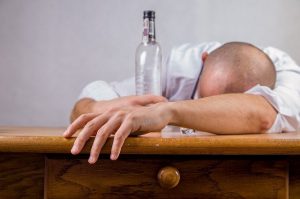 Avoid fatty foods, excessive alcohol consumption, and, surprisingly, grapefruit. The reason?
Avoid fatty foods, excessive alcohol consumption, and, surprisingly, grapefruit. The reason?
The body’s aromatase enzyme converts testosterone into estrogen when grapefruit is ingested.
Foods That Stimulate Male Sex Hormones
Of the various factors that stimulate testosterone, zinc may be the most important.
You’ll find plenty of that in raw seafood, especially oysters, and red meat, brown rice, cheese and turkey.
Other foods that boost production of testosterone include:
Fish – Cold water, oily fish, including sardines, mackerel and wild salmon are high in Omega-3 fatty acids EPA and DHA, both of which are essential to hormone production, and are an excellent source of protein. Stay with these three fish as they’re low in mercury and dangerous contaminants while the same can’t be said of shark, swordfish and many species of tuna.
Many of these species are also endangered.
Visit Monterey Aquarium’s seafood watch list to learn which fish you can safely eat and which are caught in a sustainable manner.
Honey – High in boron and B vitamins, honey may increase production of testosterone and its levels in the bloodstream.
Asparagus – You can’t go wrong with this excellent source of vitamin E, essential to all sex hormones, including you-know-what.
Asparagus has a long history as an aphrodisiac in many cultures.
Nuts – Make it a point to go nuts for this under-rated sources of healthy fats, which assist in hormone production and can leave you feeling satiated with fewer calories consumed.
Just choose the unsalted variety, as salt can neutralize any benefits you’d otherwise experience.
Men who consume oats show dramatically higher levels of testosterone than men who don’t.
Oats – Studies suggest that oats, which are high in a chemical compound called avenocosides, stimulate production of testosterone.
Men who consume oats show dramatically higher levels of testosterone than men who don’t.
Exercise
Diet’s a great place to start.
But don’t neglect exercise as an essential step in your efforts to take your body and mind back from the clutches of andropause.
You know the basics, right?
Cardio three times a week, at least 20 minutes per session and resistance training.
 Exercise makes a great stress relief and assists with good functioning of your heart, blood flow, bone density and make you feel just a heck of a lot better about the body you’re blessed with.
Exercise makes a great stress relief and assists with good functioning of your heart, blood flow, bone density and make you feel just a heck of a lot better about the body you’re blessed with.
Exercise can reduce your risk of heart disease, diabetes, fractures and high blood pressure, most of which are linked to lower testosterone.
You’re less likely to fall if you’re in shape, and several studies point out that an active 65 year old can expect an additional 12 years of disability-free living.
The most active can add five years on top of that.
Good cardiovascular activities include:- walking- running- rowing- hiking- tennis
Swimming is another good choice for cardiovascular benefits, with the added benefit that it’s an excellent way to maintain muscle form, and unlike many of the aforementioned cardio activities, it’s low-impact.
And speaking of muscle form, don’t forget the basics of resistance training, in which you build muscles by lifting weights.
You don’t have to go heavy either.
According to this study, you can build muscles by simply squeezing the most effort out of every repetition.
This is otherwise known as work-to-failure.
Beneficial muscle-building exercises include bench press, squats, deadlifts, dumb bell flies, push-ups, chin-ups and movements with exercise bands. Consider hiring a fitness trainer to implement an exercise program for your particular needs and to fight the evils of andropause.
Testosterone Replacement Therapy
You’ll want to tread lightly with any form of hormone replacement therapy (HRT), be it testosterone or growth hormone.
Proponents of testosterone therapy point to its ability to treat men with clear evidence of bone loss, loss of body mass from cancer and erectile dysfunction.
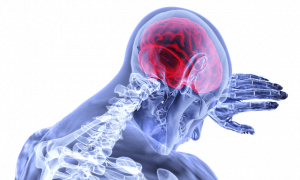 Opponents suggest it may increase risk of prostate cancer, stroke and liver toxicity.
Opponents suggest it may increase risk of prostate cancer, stroke and liver toxicity.
Where ever you plant your flag, testosterone replacement therapy is available as a patch, gel, cream or pills.
You’ll need to do this with a nod from your doctor, who should perform a prostate specific antigen (PSA) blood test to gauge your risk of prostate cancer.
This treatment may also lead to gynecomastia, or development of male-breasts.
One proponent of this controversial treatment, urologist Dr. Abraham Morgentaler, calls attention to the link between prostate cancer and low levels of testosterone – not excessive levels as previously believed.
And for that reason, testosterone therapy, according to Morgentaler, does not increase risk of this common killer of American men.
The problem with this, according to observers, is that it’s an assumption.
There’s no proof that testosterone therapy can increase risk of prostate cancer, but there is a definitive link between testosterone and the disease.
What ever that link might be, more studies are needed to monitor testosterone replacement therapy and blood pressure, kidney function, stroke risk and more.
Synthetic HGH
Less common than HRT, perhaps because of its prohibitive cost, HGH therapy refers to injections of synthetic HGH. Somatropin, as we’ve seen, one of the better known brands of HGH.
From a technical standpoint, HGH is legal only to treat patients with growth hormone deficiency, defined as people under 4 foot 10, and for cachexia.
The latter refers to loss of body mass from AIDS but the former can be loosely interpreted to gain access to HGH for cosmetic purposes.
HGH treatment is dramatic.
This is synthetic hormone, after all, and the effects are vast, with increases in muscle tone, energy, fat reduction and sex drive.
The catch?
Aside from the costs, which can easily eclipse $30,000 per year, and in some cases must be forked out for life, the health risks of synthetic HGH are many.
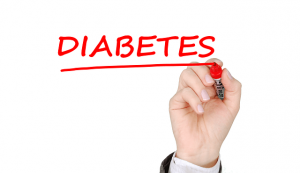 They include:- joint pain and muscle stiffness- carpal tunnel syndrome- abnormal bone growth- gynecomastia- risk of diabetes- risk of heart disease- impotence
They include:- joint pain and muscle stiffness- carpal tunnel syndrome- abnormal bone growth- gynecomastia- risk of diabetes- risk of heart disease- impotence
You should also consider their intent.
Synthetic HGH is designed to build body mass.
It is not designed to treat the depressive symptoms of andropause that make this condition such a miserable experience.
In fact, it has the opposite effect, with emotional outbursts and depression being common symptoms.
Don’t use HGH injections to treat andropause. Try another, natural option to do it instead.
Natural Treatment For Andropause
You may have heard the term ‘HGH releaser’ floating around anti-aging circles in recent years. This is a dietary supplement, of herbals and amino acids that encourage the anterior pituitary gland to release growth hormone naturally. Despite the moniker, there is no HGH in the formula. You can also call it a natural growth hormone supplement.An HGH releaser has proven benefits for anti-aging, including more energy, greater muscle tone, less fat storage and invigorated sex drive.
Patients who use an HGH releaser also report feeling better on the supplement – a welcome benefit for men afflicted with andropause.You can reduce andropause with an HGH releaser.
But you’ll want to look for an HGH releaser formulated specifically to encourage production of both growth hormone and testosterone.
For that you’ll need herbs in the formula, including muira pauma, ginkgo biloba, along with soy phytosterol complex and panax ginseng.
Specific ingredients for a troublesome issue.
And then step back and take a deep breath.
Not all men will experience andropause, but all men will experience a gradual loss of both testosterone and growth hormone.
That’s a lot to handle, and can leave a once proud man feeling mediocre.
And inadequate.
Don’t feel that way.
Talk to your doctor about your symptoms.
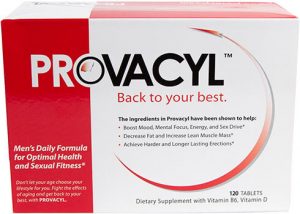 Consider testosterone therapy if you’re adventurous, or stick to a safer and proven way to reduce andropause, like Provacyl.
Consider testosterone therapy if you’re adventurous, or stick to a safer and proven way to reduce andropause, like Provacyl.
Eat right and get your butt in the gym.
You’ll win this journey, so put a smile on your face!




